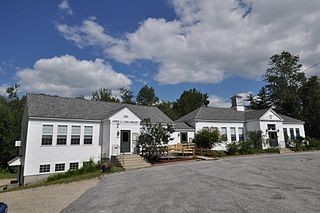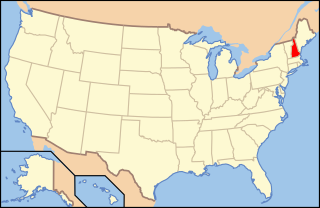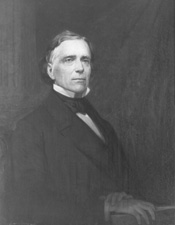Nationality is a legal relationship between an individual person and a state. Nationality affords the state jurisdiction over the person and affords the person the protection of the state. What these rights and duties are varies from state to state.

Springfield is a town in Sullivan County, New Hampshire, United States. The population was 1,311 at the 2010 census. Gile State Forest is located within the town.

Bloomfield is a town in Essex County, Vermont, United States. The population was 221 at the 2010 census, down from 261 at the 2000 census. It is part of the Berlin, NH–VT Micropolitan Statistical Area. On December 30, 1933, Bloomfield set a record low temperature for New England with −50 °F (−46 °C), a record tied along the Big Black River, Maine, on January 16, 2009.

Pittsfield is a town in Merrimack County, New Hampshire, United States. The population was 4,106 at the 2010 census.

James Miller was the first Governor of Arkansas Territory and a brevet brigadier general in the United States Army during the War of 1812. It was during his term as governor, and partly due to his influence, that the territory's capital was moved from Arkansas Post to Little Rock.
In sociology, a minority group refers to a category of people who experience relative disadvantage as compared to members of a dominant social group. Minority group membership is typically based on differences in observable characteristics or practices, such as: sex, ethnicity, race, religion, disability, gender identity, or sexual orientation. Utilizing the framework of intersectionality, it is important to recognize that an individual may simultaneously hold membership in multiple minority groups. Likewise, individuals may also be part of a minority group in regard to some characteristics, but part of a dominant group in regard to others.

The Province of New Hampshire was a colony of England and later a British province in North America. The name was first given in 1629 to the territory between the Merrimack and Piscataqua rivers on the eastern coast of North America, and was named after the county of Hampshire in southern England by Captain John Mason, its first named proprietor. In 1776 the province established an independent state and government, the State of New Hampshire, and joined with twelve other colonies to form the United States.
In diplomacy, a persona non grata is a foreign person whose entering or remaining in a particular country is prohibited by that country's government. Being so named is the most serious form of censure which a country can apply to foreign diplomats, who are otherwise protected by diplomatic immunity from arrest and other normal kinds of prosecution.

The following is an alphabetical list of articles related to the U.S. State of New Hampshire.

Hillsborough, frequently spelled Hillsboro, is a town in Hillsborough County, New Hampshire, United States. The population was 6,011 at the 2010 census. The town is home to Fox State Forest and part of Low State Forest.
In law, a ward is someone placed under the protection of a legal guardian.

Walter Harriman was an American preacher, merchant, soldier, and politician who served two terms as the Governor of New Hampshire. He was a Colonel in the Union Army during the American Civil War. On July 23, 1866, the United States Senate confirmed President Andrew Johnson's May 31, 1866 nomination of Harriman for appointment to the grade of brevet brigadier general of volunteers to rank from March 13, 1865.

The New Hampshire Department of Corrections is an executive agency of the U.S. state of New Hampshire; charged with overseeing the state correctional facilities, supervising probation and parolees, and serving in an advisory capacity in the prevention of crime and delinquency. As of June 30, 2013, the Department had an inmate population of 2,791, 15,267 on probation or parole, and 893 total employees, 470 as corrections officers and 64 as probation/parole officers. The agency has its headquarters in Concord.

James Bell was an American politician and a United States Senator from New Hampshire from 1855 until his death in 1857.

Lesbian, gay, bisexual, and transgender (LGBT) persons in the U.S. state of New Hampshire enjoy all the same legal rights as non-LGBT residents, with most advances occurring within the past two decades. Same-sex sexual activity is legal in New Hampshire, and the state began offering same-sex couples the option of forming a civil union on January 1, 2008. Civil unions offered most of the same protections as marriages with respect to state law, but not the federal benefits of marriage. Same-sex marriage in New Hampshire has been legally allowed since January 1, 2010, and one year later New Hampshire's civil unions expired, with all such unions converted to marriages. New Hampshire law has also protected against discrimination based on sexual orientation since 1998 and gender identity since 2018. Additionally, a conversion therapy ban on minors became effective in the state in January 2019.
Jim Crow laws were state and local laws that enforced racial segregation in the Southern United States. All were enacted in the late 19th and early 20th centuries by white Democratic-dominated state legislatures after the Reconstruction period. The laws were enforced until 1965. In practice, Jim Crow laws mandated racial segregation in all public facilities in the states of the former Confederate States of America, starting in the 1870s and 1880s, and were upheld in 1896, by the U.S. Supreme Court's "separate but equal" legal doctrine for facilities for African Americans, established with the court's decision in the case of Plessy vs. Ferguson. Moreover, public education had essentially been segregated since its establishment in most of the South, after the Civil War (1861–65).

Two-Spirit is a modern, pan-Indian, umbrella term used by some indigenous North Americans to describe certain people in their communities who fulfill a traditional third-gender ceremonial role in their cultures. While most people mistakenly associate the term with "LGBT Native", the term and identity of two-spirit "does not make sense" unless it is contextualized within a Native American or First Nations framework and traditional cultural understanding. The term was adopted by consensus in 1990 at an Indigenous lesbian and gay international gathering to encourage the replacement of the outdated, and now seen as inappropriate, anthropological term berdache.

Amanda Bouldin is an American politician from Manchester, New Hampshire who has served in the New Hampshire House of Representatives since January 2015. Bouldin, a Democrat, represents Hillsborough County's 12th district. She is a member of the New Hampshire Liberty Alliance and a Free State Project participant.













